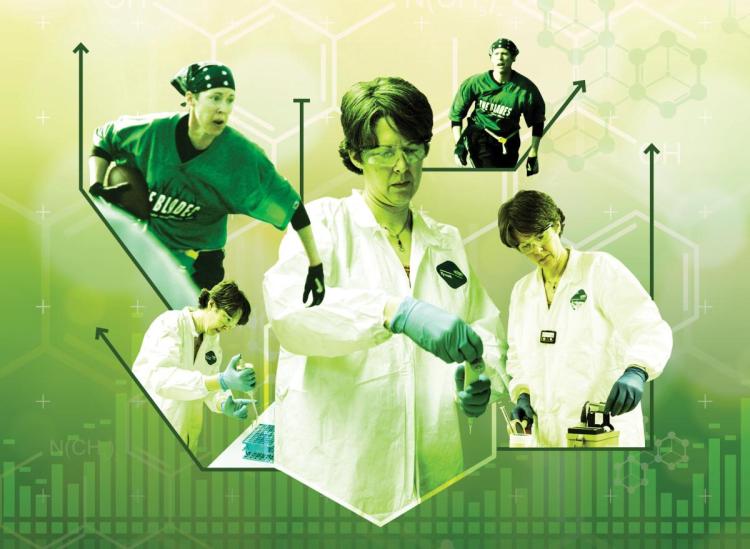
Photo illustration by Blake Dinsdale
More than a decade later, Michael Lewis still remembers the moment he reconnected with Heather Hennkens. It was at a conference in Sydney. The two had briefly overlapped at Washington University in the early 2000s, but now, years later, Lewis was a professor of veterinary medicine at Mizzou, and Hennkens was a speaker at the conference. Lewis doesn’t remember what Hennkens’s presentation was even about (it was about radiopharmaceuticals). What stands out in his memory is the sight of Hennkens at an after-party. She was dancing in a walking boot and on crutches. More shocking than that sight was the explanation she gave: She had broken her ankle playing professional football.
“I didn’t even know women played football at that level,” Lewis says. “When I found out she’d been doing that, I knew she was serious about things that you wouldn’t normally encounter in professional life. It also indicated that she does things that most people don’t do.”
Lewis encouraged Hennkens to do her postdoctoral fellowship at Mizzou, which she completed in 2009. She’s now a new assistant professor of chemistry at MU. But just because she’s hung up her cleats and put on a lab coat doesn’t mean that Hennkens has stopped playing around. “When I refer to work in the lab, I say, ‘We play with molecules,’” says Hennkens. “If I’m just chatting with people, I refer to it as play. It should be fun; you should enjoy it. If it’s your career, it should be something you can find passion in. From that perspective, work is play.”
That’s not to say that Hennkens doesn’t take her work seriously. In fact, her research might one day mean the difference between life and death for cancer patients. In her work with radiopharmaceuticals, Hennkens is trying to develop radioisotope pairs. One of the twins detects cancer and the other targets therapy that contains and eliminates the tumors. The former would help doctors precisely locate and stage tumors, and the latter would treat tumors directly, sparing adjacent organs. This could allow physicians to treat cancer without the sapping side effects of chemotherapy. It’s exactly the type of medical research that is at the core of MU’s NextGen Precision Health Initiative, and a breakthrough for Hennkens would be a game-changer.
Playfully pushing boundaries is practically in Hennkens’ DNA. One of her first memories was winning a tee-ball trophy at age 5 and then being crushed when she dropped it and broke off the bat. Growing up, she was competitive in soccer as well as in softball, which earned her a scholarship to play at Lindenwood University in St. Charles, Missouri. Eventually, chemistry labs started conflicting with practices on the diamond, so she quit the college team. But she still found time for competitive women’s fast-pitch and coed slow-pitch, where she displaced the men and took over starting shortstop duties. She also picked up flag football, which became a fixation — so much so that she decided to try out for the St. Louis Slam, then of the National Women’s Football Association, the first all-female professional tackle football league. “I wasn’t a kid; I was in grad school. It was great fun,” Hennkens says. But not all fun. “I never thought I’d have to do so much exercise with my neck. I had to watch TV with my helmet on just to get used to the weight. It was soreness like I’ve never felt before.” That pain was nothing compared to what awaited her on the field. “I was a wide receiver and kick returner,” she says. “Special teams would try to flatten me like a pancake. I loved it.”
The ankle injury that helped bring Hennkens to Mizzou also effectively ended her pro football career. Now her arena is the MU Research Reactor, where she plays with medical radioisotopes in hopes that she and her team can make them into molecules that go where doctors need them to go. Although some of the research has been tested on animals, the road from bench to bedside is a long one. But Hennkens has never been one to shy away from a challenge.